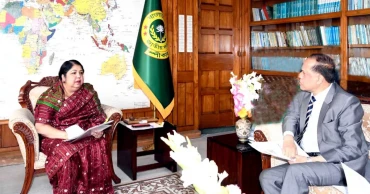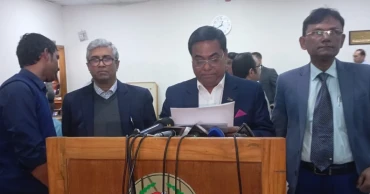Presidential election
Most parties back Electoral College for presidential election
In a significant development, the majority of political parties participating in the National Consensus Commission's second round of discussions have expressed support for changing the current presidential election process to an Electoral College-based system.
The discussions were held on Thursday at the Foreign Service Academy in the capital, where representatives from various parties deliberated on three different models — all within the framework of the Electoral College system.
Abdullah Mohammad Taher, Nayeb-e-Ameer of Jamaat-e-Islami Bangladesh, told journalists that one proposed model suggests a bicameral legislature, with 100 reserved seats for women, making up a total of 500 votes for the presidential election through both upper and lower houses.
He mentioned that several participants proposed the inclusion of 76 additional votes from Zila Parishads and City Corporations.
EC gives nod to draft code banning posters in election campaigns
“Regardless of the exact process, we support the extended Electoral College system,” said Taher, adding, “We have also recommended that the presidential election be conducted through secret ballots. All internal elections of Jamaat are held through secret ballots; the presidential election of the country should follow the same principle.”
Speaking on behalf of the Gono Adhikar Parishad, President Nurul Haque Nur said, “The method of election is still under discussion. Some have suggested incorporating Union Parishads into the Electoral College, which would add another 70,000 votes beyond the existing 576.”
Nur also raised concerns regarding the impartiality of the Commission, noting, “Bias towards one or two parties is still evident. This must be addressed. Additionally, several allies of the 14-party alliance led by the Awami League have been invited by the Commission. We will not support any party that aligns with fascist elements.”
Jonayed Saki, Chief Coordinator of the Gonosonghoti Andolon, echoed support for the Electoral College system, saying, “We agree on the need for a presidential election through an Electoral College, and we are even willing to compromise to reach a decision on this matter.”
Political parties involved in the dialogue agreed that the process would be significantly more effective if Article 70 of the Constitution were amended and voting conducted through secret ballots.
They also emphasised the need for establishing a more balanced distribution of power between the President and the Prime Minister.
8 months ago
Poland to hold presidential election on May 18: Parliament speaker
The head of Poland's parliament said Wednesday that the country's presidential election will be held on May 18, with a runoff on June 1 if needed.
The election will decide whether the pro-European Union Cabinet of Prime Minister Donald Tusk will gain an ally in the presidential palace at a challenging time for Poland and for Europe, with a full-scale war in neighbouring Ukraine.
The incumbent right-wing President Andrzej Duda is at odds with the government, blocking legislation and making strongly critical comments. In the latest spat, Duda chose skiing over attending a concert gala marking the launch of Poland's rotating presidency in the EU.
Duda is to leave office in August, ending his second five-year term. He cannot seek another term, according to Poland’s constitution.
Szymon Holownia, the powerful speaker of the lower house of parliament, or Sejm, has declared he will run for president as head of Poland 2050, a party within the ruling coalition.
Austrian FM Schallenberg appointed as interim govt leader
He said he was announcing the election date early in the political calendar to allow ample time for procedures and campaigning, which can officially begin from Jan. 15.
The powers of the president are limited in Poland, where the government decides on domestic and international policy. The president is the supreme commander of the armed forces, cooperating with the government. He can propose legislation and veto new laws and also has a say on Poland's foreign relations.
The chief governing party, the Civic Coalition, has chosen Warsaw Mayor Rafal Trzaskowski as its candidate for president. Tusk, the party's leader and former head of the European Union, has chosen to stay in his government seat.
The right-wing opposition party, Law and Justice, backs historian Karol Nawrocki in the election. Nawrocki, now head of a national history institute, IPN, has been a controversial figure. Recent media reports allege Nawrocki had ties to hard-right groups and acquaintances in criminal circles. Nawrocki denies the allegations.
Law and Justice was ousted in the 2023 general election after eight years of turbulent, euro-sceptic rule. Duda hailed from the party and was largely its ally.
A far-right leader, Slawomir Mentzen, is running in the election for the Konfederacja (Confederation) party.
1 year ago
Paraguay far-right populist presidential candidate arrested
Paraguayan police on Friday detained Paraguayo Cubas, a far-right populist who came in third in Sunday’s presidential election and encouraged his supporters to protest over his unsubstantiated claims that the vote was marred by fraud.
Cubas was being held in preventive detention under an order by the Attorney General’s Office that is accusing him of breach of the peace, Police Commissioner Gilberto Fleitas said in a radio interview.
Cubas, the candidate of the National Crusade Party who received 23% of the votes Sunday, was broadcasting live on Facebook when officers detained him outside his hotel in San Lorenzo, around 15 kilometers (9 miles) from Asunción.
Fleitas said Cubas got into a police vehicle “without any difficulty," but he continued streaming live.
In his broadcast from inside the police vehicle, Cubas chatted with officers and focused the camera on his handcuffs. “You can see now I’m being imprisoned,” he said. “All the criminals in this country should be handcuffed like Paraguayo Cubas.”
Cubas had been telling supporters since Monday that he was heading to the capital to lead a series of protests that had led to isolated clashes with police, largely outside the electoral court in Asunción.
“We will remain on the streets until Paraguayo Cubas is released,” said Juan Reyes, one of hundreds of Cubas supporters who took part in demonstrations outside the electoral court.
At least 208 people have been detained “for disturbance of public peace and other punishable offenses within the framework of the demonstrations taking place in the national territory,” police said Thursday.
Efraín Alegre, who as the candidate of a broad-based opposition coalition came in second place during Sunday’s election, demanded Cubas be released along with everyone who has been detained in protests this week.
“We demand the release of Paraguayo Cubas and all citizens imprisoned for demanding transparency," Alegre wrote on social media.
Alegre, who received 27% of the vote Sunday, conceded the race shortly after polls closed, but then on Monday called for a manual count of votes and an international audit of the country’s electronic voting system after Cubas aired his fraud allegations.
The Organization of American States, which deployed an observation mission for the election, said Tuesday there was “no reason to doubt the results” of the vote count.
Santiago Peña of the long-ruling Colorado Party easily won Sunday’s presidential election with 43% of the vote.
Over the past few days, Cubas has published images of supporters welcoming him in different parts of the country as he made his way toward the capital from Ciudad del Este, a city on the border with Brazil and Argentina.
Some 1,500 to 1,800 law enforcement officers were deployed outside the electoral court Friday for the protest staged by Cubas supporters. Authorities also prepared for any demonstration outside the police station where Cubas was taken.
2 years ago
HC bench ‘embarrassed’ to hear writ petition challenging presidential election process
A High Court bench today felt “embarrassed” to hear a writ petition filed challenging the process of electing Mohammad Shahabuddin as president.
The bench of Justice Farah Mahbub and Justice Ahmed Sohel was set to hear the petition. But it forwarded the petition to the chief justice for a decision, saying one of the bench members felt embarrassed to hear the writ petition.
Justice Ahmed Sohel expressed embarrassment, saying he was a lawyer at Anti-Corruption Commission for five years.
Also Read: Controversy over President-elect unexpected: CEC
Supreme Court lawyer MA Aziz Khan filed the writ petition with the concerned branch of the High Court on March 7.
The Election Commission and the Chief Election Commissioner (CEC) had been made respondents in the writ petition.
The writ petition was filed challenging the process through which the president was elected, and the gazette that was published later.
“Mohammad Shahabuddin was a former Commissioner of Anti-Corruption Commission (ACC). According to Section 9 of the ACC Act 2004, A former ACC Commissioner is not permitted to hold any profitable position,” he said.
Mohammad Shahabuddin, a retired judge and former Commissioner of the Anti-Corruption Commission, was elected as the country's 22nd president.
On February 13, a gazette was issued declaring him elected as President of Bangladesh under Section 7 of the Presidential Election Act, 1991.
Mohammad Shahabuddin will succeed current President M. Abdul Hamid after his term expires on April 23.
2 years ago
Nigeria's Bola Tinubu declared winner of presidential vote
Ruling party candidate Bola Tinubu was declared winner of Nigeria's presidential election early Wednesday, with the two leading opposition candidates already demanding a revote in Africa's most populous nation.
Election officials' overnight announcement was likely to lead to a court challenge by his main opponents Atiku Abubakar and Peter Obi. Abubakar also finished second in the last vote in 2019, then appealed those results before his lawsuit ultimately was dismissed.
On Tuesday, the two leading opposition parties had demanded a revote, saying that delays in uploading election results had made room for irregularities. The ruling All Progressives Congress party urged the opposition to accept defeat and not cause trouble.
Tinubu received 37% of the vote, or nearly 8.8 million, while main opposition candidate Abubakar won 29% with almost 7 million. Third-place finisher Obi took 25% with about 6.1 million, according to the results announced on live television by the Independent National Electoral Commission.
Also Read: Nigerian delegation discusses Dhaka-Abuja trade potential with BGMEA
Tinubu "having satisfied the requirements of the law, is hereby declared the winner and is returned elected,” said the country’s election chief, Mahmood Yakubu.
The announcement came after 4 a.m., but celebrations already had started late Tuesday at the ruling party’s national secretariat where Tinubu’s supporters had gathered in anticipation of his victory.
“None of the others matches his record!” said Babafemi Akin as he chatted excitedly about the prospects of a Tinubu administration. “I am sure he will do well.”
Tinubu, 70, is the former governor of Lagos state, home to Nigeria's megacity of the same name. However, he lost the state in Saturday's election to Obi, who drew a strong following among younger voters eager for change.
The parties now have three weeks to appeal results, but an election can be invalidated only if it's proven the national electoral body largely didn’t follow the law and acted in ways that could have changed the result.
The Supreme Court of Nigeria has never overturned a presidential election, though court challenges are common, including by outgoing President Muhammadu Buhari, who doggedly fought his past election losses for months in vain.
Nigeria’s presidential election has been closely watched as the country is not only the continent’s largest economy but it is also one of the continent’s top oil producers.
Observers have said Saturday’s election was mostly peaceful, though delays caused some voters to wait until the following day to cast their ballots. Many Nigerians had difficulties getting to their polling stations because of a currency redesign that resulted in a shortage of bank notes.
3 years ago
BNP has no interest in presidential election: Mosharraf
BNP senior leader Khandaker Mosharraf Hossain on Saturday said their party has no interest in the presidential election.
“We do not want to comment on what this government is doing or not doing,” he told reporters at a press conference at the BNP chairperson’s Gulshan office as they sought his comment on the ruling party’s nomination for the presidential election.
The BNP leader said the purpose of their press conference was to inform the media about the attacks and obstruction by the police and the ruling party activists during their party’s countrywide march programme at the union level on Saturday.
Mosharraf, a BNP standing committee member, said they are least bothered about who is going to be the next president of the country as their main focus is now on the ongoing movement for realizing their 10-point demand, including the restoration of the government, dissolution of parliament and holding the next polls under a caretaker government.
Awami League Advisory Council Member and freedom fighter Md Shahabuddin Chuppu is set to be the next President of Bangladesh as the ruling party nominated him as the party’s presidential candidate.
Also read: Profile of Md Shahabuddin
A delegation of Awami League, led by party General Secretary Obaidul Quader, went to the Election Commission in the morning and submitted the nomination paper of its presidential candidate.
Md Shahabuddin, a retired district and session judge, had served as a commissioner at the Anti-Corruption Commission.
3 years ago
Schedule for presidential election to be announced Wednesday
Chief Election Commissioner (CEC) Kazi Habibul Awal on Tuesday said the schedule for the presidential election will be announced on Wednesday ( tomorrow).
CEC Awal said this while talking to the media at his office in the city's Agargaon area after holding a meeting with Jatiya Sangsad (JS) Speaker Dr Shirin Sharmin Chaudhury at national parliament.
Kazi Awal said the schedule of the presidential election will be disclosed after a meeting of the election commission to be held at 11 am tomorrow in the Election Commission.
Parliament Secretariat Senior Secretary KM Abdus Salam and Election Commission (EC) Secretary Md Jahangir Alam were present during the meeting.
Director ( Public Relations) of Parliament Tarik Mahmud said CEC met the Speaker of the Parliament and discussed the presidential election.
Read more: Presidential election within February 23 : EC secretary
Speaker Shirin Sharmin thanked the Chief Election Commissioner after being apprised of the developments.
CEC informed the Speaker that they are ready to conduct the election in due time.
According to the Constitution, a new president has to be elected within 90 to 60 days prior to the end of the incumbent president's tenure.
The previous presidential election schedule was announced on January 25, 2018.
Abdul Hamid was elected president unopposed for the second term on 6 February though the election slated for 18 February.
President Abdul Hamid is set to complete his tenure on April 23 this year.
Read more: CEC meets Speaker Tuesday to discuss presidential election
3 years ago
Presidential election within February 23 : EC secretary
The presidential election of Bangladesh will be held within February 23.
Election Commission (EC) Secretary Md. Jahangir Alam said this while talking to reporters after a meeting held at EC building on Sunday.
"The process has already started. We will contact the Parliament Secretariat and fix the date of the Chief Election Commissioner’s meeting with the Speaker," he said.
Current president Abdul Hamid cannot be elected president for another term as the country’s constitution allows a maximum of two terms for a person in the post of president.
Hamid is the only President who has been serving for two consecutive terms. His second and last tenure will expire on April 24 this year.
On Apr 24, 2013, Abdul Hamid was sworn in as the 20th President of Bangladesh.
Read More: EC starts receiving applications for settling objections to draft voter list
After the end of his first tenure, Hamid also took oath as the president on the same date in 2018 for the second term.
Lawmakers vote in the presidential election, which is supposed to be held in the House with the CEC acting as the election officer.
3 years ago
Presidential election will be held in due time: Law Minister
Law Minister Anisul Huq on Wednesday said the presidential election will be held in due time since the second term of Abdul Hamid expires in April next.
Talking to reporters after inaugurating a workshop, he also said that the government has so far no plans to amend the constitution.
“The presidential election will be held in the due course of time. Since he (Hamid) was elected the President for two terms, he can't stay any longer (in the post) as per the constitution,” the minister said.
Read more: Law Minister sounds out govt's bullish mood on election
The workshop was organised in collaboration with the United Kingdom at the Judicial Administration Training Institute in the capital for the lower court judges.
Various problems of the judiciary of Bangladesh, including case backlog, case management, and ways of quick case disposal, will be discussed in the four-day workshop.
On Apr 24, 2013, Abdul Hamid was sworn in as the 20th President of Bangladesh.
After the end of his first tenure, Hamid also took oath as the president on the same date in 2018 for the second term.
Hamid is the only President who has been serving for two consecutive terms. His second and last tenure will expire on April 24 this year. The country’s constitution allows a maximum of two terms for a person in the post of president.
Read more: Human rights violators will be brought under justice: Law Minister
There was speculation that the government may amend the constitution to allow Hamid to stay in the post for another term, but the law minister categorically said they have no such plans.
About the apex court’s bail to BNP secretary general Mirza Fakhrul Islam Alamgir and standing committee member Mirza Abbas, he said no ministry, including the law ministry, is interfering in the work of the court.
“The court will grant bail as per its wish. The court won’t give bail if it thinks it can't be given,” he observed.
Huq also said it often happens that the apex courts are granting the BNP leaders bail when the lower court is denying it.
He also said staying the lower court’s bail by the apex court is nothing new in Bangladesh.
“Those who have raised questions about it, may not have seen the rules of Jatiya Party and BNP.”
3 years ago
EXPLAINER: Why Kenya's presidential election is important
Kenyans are voting Tuesday to choose a successor to President Uhuru Kenyatta. The race is close and could go to a runoff for the first time.
One top candidate is Raila Odinga, an opposition leader in his fifth run for the presidency who is being supported by his former rival Kenyatta. The other is William Ruto, Kenyatta’s deputy who fell out with the president earlier in their decade in power.
Both tend to focus far more on domestic issues, raising the question of how either will follow up on Kenyatta's diplomatic efforts to quell the tensions in neighboring Ethiopia or disputes between Rwanda and Congo.
WHAT’S AT STAKE?
Kenya is East Africa’s economic hub and home to about 56 million people. The country has a recent history of turbulent elections. Even then, it stands out for its relative stability in a region where some elections are deeply challenged and longtime leaders such as Rwandan President Paul Kagame and Ugandan President Yoweri Museveni have been declared the winner with almost 99% of votes, or been widely accused of physically cracking down on contenders.
Kenya has no transparency in campaign donations or spending. Some candidates for Parliament and other posts are estimated to be spending hundreds of thousands of dollars to gain access to power and its benefits, both legal and illegal.
WHAT ARE THE MAIN CANDIDATES' PLATFORMS?
The 55-year-old Ruto promotes himself to the young and poor as a “hustler” who rose from humble beginnings as a chicken seller in contrast to the elite backgrounds of Kenyatta and Odinga. He seeks greater agricultural productivity and financial inclusion. Agriculture is a main driver of Kenya’s economy and about 70% of the rural workforce is in farming.
The 77-year-old Odinga, famous for being jailed while fighting for multi-party democracy decades ago, has promised cash handouts to Kenya’s poorest and more accessible health care for all. In his final campaign speech on Saturday, he said that if elected, his government in its first 100 days would begin paying 6,000 shillings ($50) to families living below the poverty line.
WHAT DO VOTERS CARE ABOUT?
Odinga and Ruto have long circled among contenders for the presidency, and there is a measure of apathy among Kenyans, especially younger ones in a country where the median age is about 20. The electoral commission signed up less than half of the new voters it had hoped for, just 2.5 million.
Key issues in every election include widespread corruption and the economy. Kenyans have been hurt by rising prices for food and fuel in the wake of Russia’s invasion of Ukraine, and that comes after the financial pain of the COVID-19 pandemic. More than a third of the country’s youth are unemployed.
WHEN WILL KENYA HAVE A WINNER?
Official results will be announced within a week of the vote. To win outright, a candidate needs more than half of all votes and at least 25% of the votes in more than half of Kenya’s 47 counties. No outright winner means a runoff election within 30 days.
The previous presidential election in 2017 made history when a top court overturned the results and ordered a new vote, a first in Africa. If the courts again call for a new vote, such an election would take place within 60 days of the ruling. Candidates or others have a week after the results are declared to file a petition to the court, which has two weeks to rule on it.
“I want you to know that we as a country are at an inflection point,” Odinga told the crowd listening to his campaign speech Saturday. “Either something very good will happen or something terrible will happen.”
He vowed to shake the hand of his “rivals” whether he wins or loses.
3 years ago


















